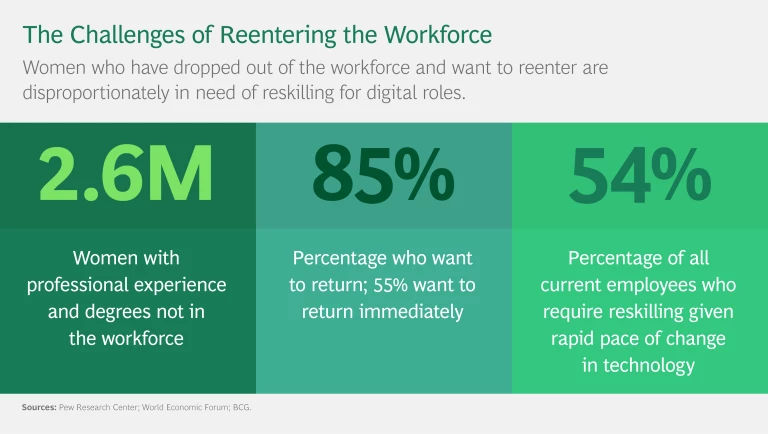We know that automation and technological disruption will alter the world of work. In the 2020s, winning organizations will be those that can The New Logic of Competition. Companies that continually provide their employees at all levels with the latest digital skills will be the most likely to thrive and attract top talent.
This reskilling imperative may offer just the opportunity we need to finally usher in meaningful change in the struggle for gender diversity. It will enable companies to move more women into good jobs, keep them in the workforce, and bring back those who have left.
Stepping Up the Rate of Change
Business leaders have the power to improve the corporate gender balance by making diversity a part of their own personal agenda. Sponsoring women, for example, can help to establish a more gender-balanced leadership pipeline. Role modeling a work life that makes leadership seem realistic, by taking advantage of flex time and remote schedules, can keep women on board.
But executives have not taken on this agenda with the urgency necessary, and the gender diversity gap in the corporate world is still far too great.
A reskilling revolution could dramatically increase the rate of change.
Upskilling can provide promising female employees with the skills they’ll need to be leaders in a new digital era.
If corporate leaders double down on their investments in reskilling throughout the new decade, they can take advantage of untapped female talent and ensure that women aren’t disproportionately losing jobs. At the same time, a focus on upskilling measures can provide promising female employees with the skills they’ll need to be leaders in a new digital era.
Challenges for Women in the Future Workplace
Organizations are already finding it harder to pull in enough recruits with the advanced digital skills required for an increasing number of jobs. By 2022, at least 54% of all employees worldwide will need significant reskilling and upskilling. The half-life of a job skill today is about five years—and falling. For organizations around the world to thrive throughout and beyond the 2020s, they will have to invest in comprehensive training programs in digital and in data and analytics for millions of workers, continually developing generations of agile learners with the latest skills.
The IMF projects that 11% of jobs currently held by women are at risk of elimination as a result of digital technologies—a higher percentage than for jobs held by men. Technology can even keep women from getting the job in the first place; there’s evidence that AI algorithms in talent management, for example, have generated results biased against female recruits because of a cumulative bias contained in the data.
And although STEM experts may be at a distinct advantage in tomorrow’s workforce, most of them are men. Women hold 56% of university degrees overall but just 36% of STEM degrees, and they make up only 25% of the STEM workforce. Just 22% of AI professionals and 12% of machine-learning experts are women, according to a World Economic Forum–LinkedIn study.
The Reskilling Advantage
Instead of allowing digital disruptions in the workplace to cast women aside, reskilling presents a clear way to build advantage in challenging times and drastically speed up the pace of progress on diversity—a strategy that will be good for women and crucial for the longevity of organizations.
Reskilling presents a clear way to build advantage in challenging times and drastically speed up the pace of progress on diversity.
BCG–World Economic Forum research shows that 95% of workers who are at risk of being phased out by technology could be retrained for jobs that pay as much or more. Reskilling can flip the odds and offer significant opportunities for women, particularly in the STEM roles that are so in demand. As administrative or clerical jobs held mainly by women begin to disappear, women can learn new skills—and be retrained as the needs of organizations change.
Leaders should follow a series of steps to ensure that their reskilling program is successful and keeps women in the workforce:
- Target reskilling offerings to business functions with an overrepresentation of women—such as human resources and administrative teams—where roles are most vulnerable.
- Require a high number, such as 50%, of female participants in the program.
- Involve female leaders in the curriculum, providing women who participate with important role models.
- Design content that includes gender-neutral job descriptions.
- Offer flexible formats so that employees with busy jobs can manage the workload.
- Include senior leaders, too. It is absolutely critical for leaders to keep learning and remain relevant as the world of work changes.
Reskilling also offers an exciting strategy for bringing women who have stopped working mid-career back to work. (See the exhibit.) Women drop out of the workforce at higher rates than men do, and the pace of change within skilled digital jobs is so fast that it likely makes them feel less confident about returning. A targeted reskilling curriculum aimed at women who are eager to reenter the workforce can make a huge difference.
Peter Fitzgerald, president of Google Japan, recently shared with me the exciting details of a commitment by his company—in partnership with more than 1,000 other businesses—to provide digital training and retraining to 10 million people in Japan by 2022. Part of this is an initiative called Women Will. Launched in 2014, when studies showed that two out of three women in Japan did not return to work after having children, Women Will runs a program that helps new moms return to the workforce by leveraging technologies, such as internet-enabled tools, that allow for a more flexible work style.
A Win for Women, a Win for Companies
One defining feature of a company that will survive and thrive through the 2020s will be its diversity—a quality that we know drives both The Business Imperative of Diversity. But increasing diversity has been one of the most difficult line items to check off. Although we have to keep up with both ground and air battles against gender imbalance at every level, reskilling and upskilling have the potential to accelerate the sluggish rate of progress—and position organizations for a winning decade.
Employers will not be able to rely on the traditional marketplace to fill the digital gaps within their organizations. Investing in comprehensive, carefully targeted training programs in digital technologies will give women with endangered jobs valuable skills and offer former workers a practical way to return. With a balanced workforce armed with the most important skills of the day, organizations can find success in the digital age of tomorrow.
A version of this article was originally published by the World Economic Forum.







